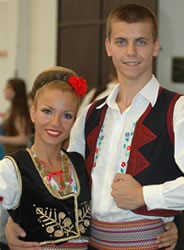The Serbs are a southern Slavic people who received strong cultural influence from the Ottoman Turks. They came from the coast of the Black Sea to the Balkans and north of the Danube River between Dniepar and the northeast Carpathian Mountains. Though their language is Slavic based, the 500 years they were controlled by the Turkish based Ottoman Empire gave their language a Turkish flavor. The Kingdom of Serbs, Croats and Slovenes was formed in 1918 and its name was changed to Yugoslavia in 1929.
The unraveling of Yugoslavia in the early 1990s resulted in the formation of the Independent Republics of Slovenia, Croatia and Macedonia in 1991. Bosnia-Hercegovina was formed in 1992, while Serbia and Montenegro remained as the new Federal Republic of Yugoslavia. Its leader, Slobodan Milosevic, tried to unite the neighboring republics into a "Greater Serbia," meaning other ethnic groups would be dominated by the Serbs. His effort failed, and Milosevic was ousted by his own people in October 2000. The two latter republics formed a loose union in 2002, called Serbia and Montenegro. Many Montenegrins regard themselves as Serbs, but others insist that Montenegrin is a separate ethnic identity.
Though most Serbs live in Serbia, there is a significant Serbian diaspora, especially in other European countries and in North America.
Others have migrated to Australia. There have been three waves of Serbian migration to Australia, all in the 20th century. Some came after the devastation of WWII. Others came because of the poor economy in their home country (Yugoslavia) in the 1960s. Finally, there were war refugees who left in the 1990s.
The best known Australians of Serbian descent are either models or athletes. Today most Serbs in Australia speak Serbian at home. They have their own cultural associations.
Serbs speak loudly when they are passionate about something. They believe that being soft spoken implies insecurity. Serbs tend to be blunt in their communication style and add dark humor to the conversation. Good eye contact is important if you want a Serb to trust you. They tend to stand close to those they know.
The Serbs are a highly family-oriented society. They have an elaborate vocabulary for family relationships, even up to the 15th level of the genealogical tree.
Serbian weddings include a circle dance called kolo, where dancers hold each other by the hands or around the waist, dancing in a circle. The Serbs believe this dance symbolizes the sun. At weddings and other celebrations, Serbs drink rakia, an alcoholic beverage made from fruit.
Serbs have unique customs regarding Christmas. They celebrate Christmas by enjoying special foods and rituals. They eat sweet cakes made of wheat, called koljivo. Cesnica, a special kind of bread, contains a coin, and the one who finds the coin when the bread is broken believes he or she will have an especially happy year. A traditional Serb Christmas custom is to cover the floors of homes and churches with hay, reminding the family of the stable where Jesus was born. Christmas day is celebrated with a feast, featuring a roasted piglet as the main meal. Serbs give gifts to family and friends on Saint Nicholas Day.
Most Serbs are either non-religious or they identity with the Serbian Orthodox Church. The Serbs converted from traditional Slavic beliefs in several waves between the seventh and ninth centuries. Some folkloric and traditional beliefs persist to this day, such as belief in fairies, witches and vampires. They offer food and drink to the dead on certain feast days.
Of all Slavic and Orthodox Christians, only Serbs have the custom of Slava. This is a celebration of the family patron saint, whom they believe protects them. A Slava is inherited from father to son, and each household may only have one. The Slava celebration involves bringing the family together for three days of celebration, ritual dishes, folk oratory and singing.
Serbians have their own Orthodox church, but most of them are disillusioned with religion. They need the chance to learn about the person, Jesus Christ, who is above religion.
Pray that Serbs would seek a relationship with their savior, Jesus Christ.
Ask the Lord to help Serbian Christians and church planters to use holidays like Christmas to share the story of Jesus and his love for all nations.
Pray for a Holy Spirit empowered revival among Serbs all over the world.
Scripture Prayers for the Serb in Australia.
World Prayer Center / GAAPNet
https://en.wikipedia.org/wiki/Serbs
https://en.wikipedia.org/wiki/Serbian_Australians
https://culturalatlas.sbs.com.au/serbian-c
| Profile Source: Joshua Project |










